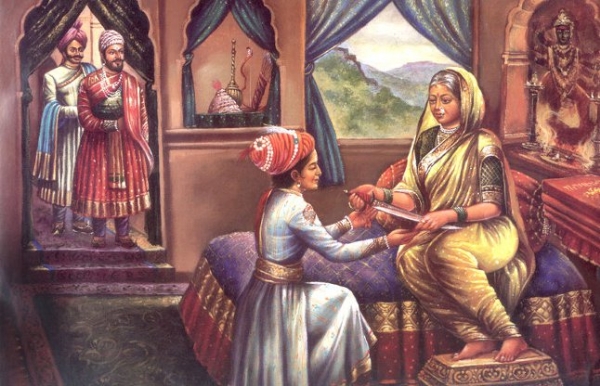Remembering Jijamata: The Mother Who Forged an Eternal Empire Based on Dharma
Jijamata’s understanding of power was unique. She taught her son Shivaji that true power is rooted in righteousness, not just in conquest.
Total Views |
"युगंधरा प्रभू शिवा की वीर जननि तू
वीर शहाजी की वीर धर्मपत्नि तू
जय जिजा सुपावनी तेजदीप्ति तू "
वीर शहाजी की वीर धर्मपत्नि तू
जय जिजा सुपावनी तेजदीप्ति तू "
When we remember Chhatrapati Shivaji Maharaj, the greatest King of Hindavi Swarajya, it is also important to remember the sacred fire that lit his path. His mother, Rajmata Jijabai. On the 351st punyatithi of Rajmata Jijamata, observed on 17th June, we are not merely remembering a mother, but honouring the sacred womb that nurtured the spirit of a civilizational awakening.

The relationship between Jijabai and Shivaji Maharaj was far beyond that of a mother and son. It was divine destiny manifesting through two souls aligned for dharma, for nationhood, for a greater cause that would echo across centuries. If Shivaji Maharaj was the sword of Swarajya, Jijamata was the soul that sharpened its edge and the spirit that guided its strike.
Jijabai was not just a queen or a mother; she was a visionary, a moral compass, and the original architect of what would later become Hindavi Swarajya. Her thoughts and guidance built the foundation on which Shivaji Maharaj would go on to construct one of the most remarkable kingdoms in Indian history that has been eternally characterized as just, inclusive, and spiritually rooted.
She was the very essence of motherhood. She was not just the giver of life, but a powerful guardian and gentle nurturer of timeless dharmic truths. Her strength was not ornamental, it was forged through sacrifice. How? Not much is known about this aspect of her life but Jijamata gave up the comforts of her own life, faced humiliation, political turmoil, personal losses, and yet stood unshaken, so that a righteous kingdom could be born. Her vision was clear:
"This is not just about my son becoming king. This is about dharma ruling again."
From the earliest days, she imbibed Shivaji with the nectar of patriotism, righteousness, and courage. The lullabies she sang for little Shivaji were war-cries softened by affection. With a bold personality, her actions weren’t confined to the palace, they reached deep into the societal fabric, inspiring reformation, justice, and empowerment, especially for women.
One cannot ignore her fierce intellect and sharp foresight. Before Shivaji’s historic meeting with Afzal Khan, it was Jijamata who warned him, saying, “Musalmaan beimaan, Khan rakhina tumhala” ('मुसलमान बेईमान, खान राखीना तुम्हाला'). This was not her prejudice. It was the prescient warning of a strategist who knew the brutal deceit of the enemy. Her advice played a crucial role in Shivaji's survival and triumph, demonstrating that Jijabai was not merely the woman behind the throne. She was a strategist alongside it.
Her influence also shaped Shivaji Maharaj's moral and administrative values. The famed incident of returning the daughter-in-law of Kalyan’s subhedar with respect is not just a tale of chivalry but it is the embodiment of Jijabai’s teachings on the sanctity of womanhood. It reflected her conviction that a ruler must protect, not plunder, and govern with dignity, not dominance.
Jijamata’s understanding of power was unique. She taught her son Shivaji that true power is rooted in righteousness, not just in conquest. Her idea of Swarajya was not a mere political rebellion; it was a sacred duty to uphold justice, dharma, and the welfare of the people. She turned Shivaji’s rule into a people’s rule, where governance meant lok-kalyan (public welfare) and not royal luxury.
Even when Maharaj was away on campaigns, it was Jijabai who administered justice, who resolved disputes, who ensured governance didn't falter. She even overruled Shivaji’s decision once, an act that shows she was not just a figurehead, but a moral force, courageous enough to correct even the sovereign for the sake of justice.
Her efforts towards women’s empowerment in the 17th century remain unparalleled. She encouraged education, self-respect, and independence among women. In an age where women were bound by customs, Jijamata broke barriers through thought and action. She proved that a woman could be the womb of a nation, the mind of a state, and the spine of a revolution.
She challenged blind faith and fought against social evils, reminding people that faith should empower, not enslave. "The land is our mother," she said. “It cannot curse us. Till we sow and till it, it will bless us.” These were revolutionary ideas shaking the very roots of superstitions.
Today, as we stand in a time where role models are often sought in the shallowest of places, Jijamata's life reminds us that the true strength of a nation lies in its mothers. Not just those who give birth, but those who awaken consciousness, forge character, and sacrifice for dharma.
The story of Shivaji Maharaj is incomplete without Jijamata. The Hindavi Swarajya that took shape under Maharaj’s leadership was first nurtured in the lap of a mother whose womb carried not just a child but a revolution.
Let us remember her not just with reverence, but with a resolve to pass on her legacy of strength, sacrifice, and vision to the daughters and sons of Bharat.
The article is originally published as an Info Pack on Vayuveg
--

